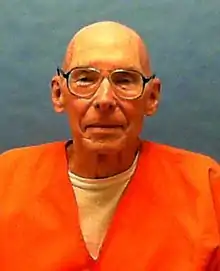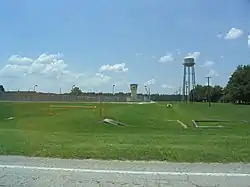Tommy Zeigler case
The Tommy Zeigler case refers to the murders of four people in Winter Garden, Florida on December 24, 1975. Thirty-year-old Tommy Zeigler was charged for the quadruple murder of his wife, her parents, and another man at his family-owned furniture store. He was tried and convicted on July 2, 1976. Zeigler was sentenced to death on July 16, 1976, for two of the murders, in addition to life imprisonment.[1][2]

Murders and conviction
On July 2, 1976, thirty-year-old William Thomas "Tommy" Zeigler Jr. (born July 25, 1945)[3] was convicted of the quadruple murder of his wife, Eunice Zeigler, and her parents, Perry and Virginia Edwards, as well as a customer named Charlie Mays.
On December 24, 1975, at Zeigler’s furniture store in Winter Garden, Florida, somebody fired approximately 30 bullets. Eunice Zeigler and Virginia Edwards were shot and killed. Perry Edwards and Charlie Mays were beaten to death with a metal crank. Police later found the crank and five guns at the murder scene.[4]
Tommy Zeigler was also shot and wounded in the abdomen. Prosecutors later theorized he shot himself in an attempt to make it look like Mays and two other men (Edward Williams and Felton Thomas) committed the murders while robbing the furniture store.[1] Williams and Thomas eventually testified against Zeigler.
A few days after the shootings, while he was in the hospital, Zeigler was arrested and charged with the murders. According to the prosecution, Zeigler's motive for the murders was to collect the money from two life insurance policies which were taken out on his wife months before the murders. These policies were worth a total of $500,000.
Zeigler has always said that he was a victim of a bad robbery attempt. He has also maintained that Charlie Mays was involved in this robbery.[5][6] As recently as 2015, Zeigler has also said that his brother-in-law, Perry Edwards, Jr., was the person who planned the murders.[7]
Due to publicity, Zeigler’s trial was moved to Jacksonville, Florida.[8] A jury found him guilty. He was given the death penalty for the murders of his wife and Mays. He was also sentenced to life imprisonment for the murders of his wife's parents.
Controversy
The case against Zeigler, and his trial, has been the subject of criticism by many, including civil rights activist Bianca Jagger, and a juror who voted to convict Zeigler.[9][5][6] Among the criticized points was the judge who oversaw the trial, Maurice M. Paul; months before the murders, both Zeigler and Judge Paul testified in an unrelated case on opposing sides.[8] Although the jury at Zeigler's trial recommended life imprisonment, Judge Paul instead sentenced Zeigler to death.[5][6]
At Zeigler's trial, one of the key eyewitnesses for the prosecution, Felton Thomas, testified that on the night of the murders, he, Zeigler, and Charlie Mays drove to an orange grove to fire some guns. The prosecution believed that this was a plan from Zeigler to get their fingerprints on the guns. In 2013, however, Felton Thomas recanted parts of his testimony.[10]
In 2011, Zeigler's private investigator, Lynn-Marie Carty, located a new eyewitness named Robert Foster. On the night of the murders, he attempted to rob a gas station across the street from the Zeigler Furniture Store. Don Frye, the lead investigator on the case, had lied about Foster, saying his name was a typographical error.[11]

Aftermath
Zeigler was scheduled to be executed on October 22, 1982. However, the U.S. District Court in Jacksonville stayed the execution due to new evidence. Zeigler was then scheduled to be executed on May 20, 1986. Zeigler's lawyers, Harold Vernon Davids and Ralph Vincent "Terry" Hadley, III rejected the two attempted executions. The 11th Circuit Court of Appeal stayed the execution due to inadequate representation.[12] In April 1988, Zeigler's death sentence was overturned.[13] Zeigler was re-sentenced and again given the death penalty.[8]
In 2005, Zeigler's request for a new trial was denied after DNA tests failed to conclude that Charlie Mays was the perpetrator.[5][6]
Zeigler's case was denied bloodstain DNA analysis in 2013 and 2016.[14][15]
In April 2017, Zeigler's case was denied Touch DNA analysis.[16]
In May 2021, a Florida prosecutor agreed to allow DNA testing on evidence that helped convict Zeigler.[17] Attorney General Ashley Moody however has filed a motion trying to block it; the hearing is still pending.
On July 1, 2022, the Florida Supreme Court (7 to Zero Ruling) rejected Florida Attorney General Ashley Moody’s attempt to block modern DNA testing paid for by Ziegler’s attorneys.
Zeigler’s DNA hearing was set for September 19, 2022. On December 19, 2022, he was granted permission for a DNA test.[18]
In popular culture
Zeigler's case was featured on the television program, Unsolved Mysteries.[19] A documentary entitled "A Question of Innocence" was released in 2014 about Zeigler's case, and the death penalty in the United States.[20]
In 1992, a book was released by Phillip Finch on Zeigler's case, entitled Fatal Flaw: A True Story of Malice and Murder in a Small Southern Town.[21]
See also
References
- Hess, Jennie (August 11, 1986). "Tommy Zeigler: 'mastermind' or victim?". The Palm Beach Post. pp. 1, 3. Retrieved August 25, 2017 – via Newspapers.com.

- "Mass-Murderer Sentenced to Death". Miami Herald. July 17, 1976. p. 17. Retrieved October 15, 2022 – via Newspapers.com.

- "Inmate Population Information Detail - William T. Zeigler". Florida Department of Corrections. Retrieved January 8, 2021.
- Roy, Roger (May 18, 1986). "Zeigler tale of blood, greed nears end". Orlando Sentinel. pp. 1, 16. Retrieved August 25, 2017 – via Newspapers.com.

- Colarossi, Anthony (December 19, 2010). "35 years after killings, Zeigler touts DNA test". Orlando Sentinel. pp. A1, A10. Retrieved August 26, 2017 – via Newspapers.com.

- Colarossi, Anthony (December 19, 2010). "The Case For And Against Zeigler". Orlando Sentinel. p. A10. Retrieved March 16, 2023 – via Newspapers.com.

- Greg Fox (November 9, 2015). "Last chance to spare Tommy Zeigler's life may be modern science". wesh.com.
- Roy, Roger (December 23, 1995). "The case that haunts a holiday". Orlando Sentinel. pp. 1, 4. Retrieved August 25, 2017 – via Newspapers.com.

- Bianca Jagger (December 28, 2004). "Grant Tommy Zeigler an Opportunity to Prove his Innocence". commondreams.org.
- Elyssa Cherney (March 8, 2016). "Tommy Zeigler case: Justice journalists probe 1976 murder conviction". orlandosentinel.com.
- Leonora LaPeter Anton (February 22, 2014). "Local investigator hopes withheld evidence will help death row inmate". tampabay.com.
- "Court upholds Zeigler's stay, says he was ineffectively represented". Orlando Sentinel. November 25, 1986. p. 27. Retrieved August 25, 2017 – via Newspapers.com.

- Levenson, Bob (April 8, 1988). "Zeigler gets hearing on death penalty". Orlando Sentinel. pp. 1, 10. Retrieved August 25, 2017 – via Newspapers.com.

- Weiner, Jeff (February 22, 2013). "Florida's Supreme Court rejects latest motion by death-row inmate". Orlando Sentinel. p. B3. Retrieved August 26, 2017 – via Newspapers.com.

- Elyssa Cherney (July 19, 2016). "Judge denies Tommy Ziegler's request". orlandosentinel.com.
- Staff (April 21, 2017). "Florida Supreme Court denies new DNA analysis in death row inmate William 'Tommy' Zeigler's case". tampabay.com.
- "Florida death row inmate to get DNA tests in 1975 killings". The Independent. May 21, 2021. Retrieved May 21, 2021.
- Anton, Leonora LaPeter (December 19, 2022). "Death row inmate Tommy Zeigler gets all-clear for DNA testing". Tampa Bay Times. Retrieved December 20, 2022.
- Roy, Roger (February 7, 1997). "NBC show turns camera on Winter Garden murders". Orlando Sentinel. p. 72. Retrieved August 25, 2017 – via Newspapers.com.

- Shelli Weinstein (July 9, 2014). "Investigation Discovery Expands Docu Push with 3 New Titles". variety.com.
- Finch, Phillip (1992). Fatal Flaw: A True Story of Malice and Murder in a Small Southern Town. Villard Books. ISBN 9780679408611.